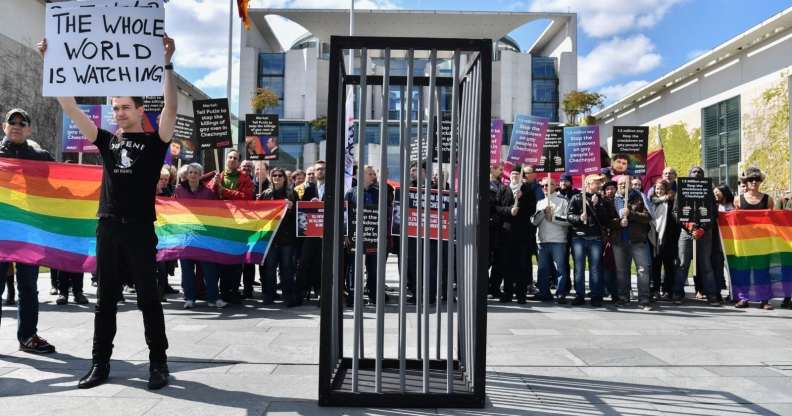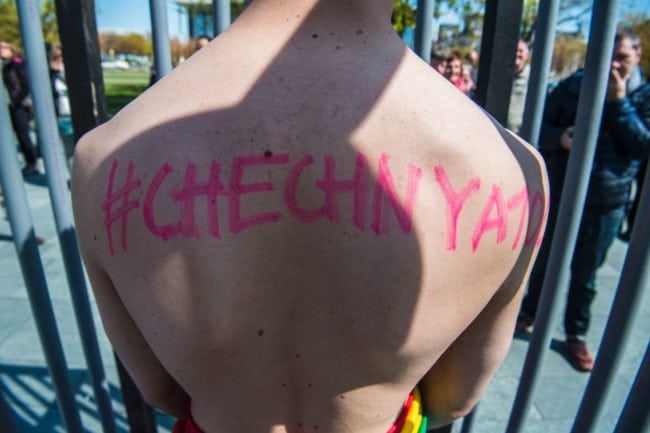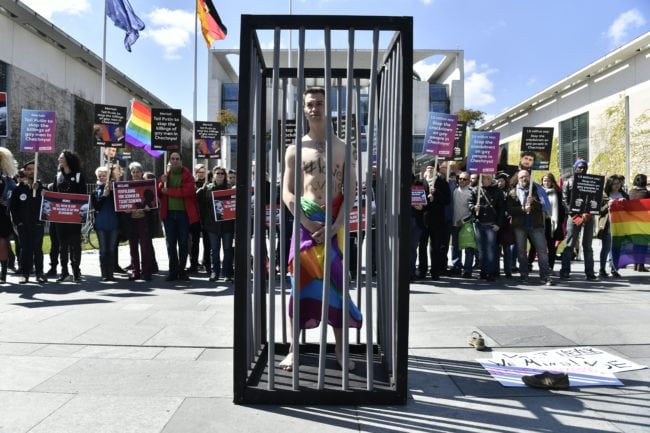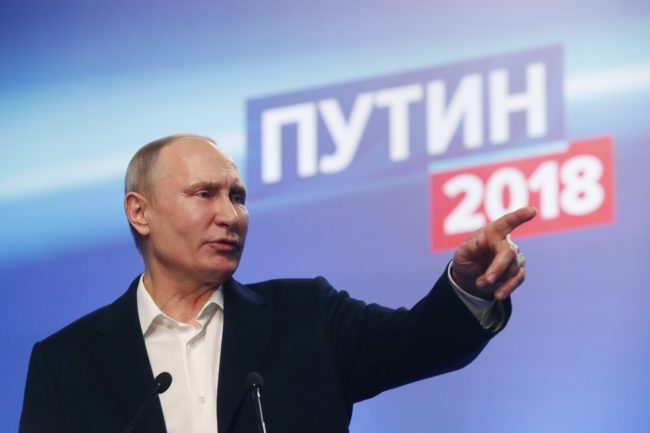15 countries condemn ‘inadequate’ Russian response to Chechnya homophobic purge

A protest in Berlin calling on Russian President to put an end to the persecution of gay men in Chechnya. (JOHN MACDOUGALL/AFP/Getty)
A group of countries have triggered an international action against Russia over the homophobic purge in Chechnya.
Human rights monitors first reported in February 2017 that authorities in Chechnya – an autonomous region of Russia – were carrying out a homophobic purge.
Gay people in the region have faced arrest, torture and execution, but the Kremlin has consistently refused to intervene, even as Head of the Chechen Republic Ramzan Kadyrov publicly stated that homosexuals are “not people” who should be removed to “purify” the blood of the region.
The international community has been slow to respond to the situation, but action was today launched via the Organization for Security and Co‑operation in Europe (OSCE), of which Russia is a member.

A protest in Berlin calling on Russian President to put an end to the persecution of gay men in Chechnya. (JOHN MACDOUGALL/AFP/Getty)
15 states have signed a statement invoking the OSCE’s rarely-used Vienna Mechanism, which triggers a procedure to question another member on serious human rights issues.
The statement was signed by Canada, Denmark, Estonia, Finland, France, Germany, Iceland, Ireland, Latvia, Lithuania, the Netherlands, Norway, Sweden, the United Kingdom and the United States.
It states: “Our countries continue to be deeply concerned about serious human rights violations and abuses in Chechnya.
“Numerous credible reports by media and civil society organizations over the past 20 months have alleged worrying actions taken by Chechen authorities against persons based on their perceived or actual sexual orientation or gender identity, as well as human right defenders, lawyers, independent media, civil society organizations, and others.
“These actions include harassment and persecution, arbitrary or unlawful arrests or detention, torture, enforced disappearances and extrajudicial executions. The Russian Federation’s apparent unwillingness or inability to address these serious human rights violations has contributed to a climate of impunity for authorities in Chechnya in perpetrating such violations.”

A protest in Berlin calling on Russian President to put an end to the persecution of gay men in Chechnya. (JOHN MACDOUGALL/AFP/Getty)
It adds: “Our delegations, as well as many others at the Permanent Council, have repeatedly raised concerns about these violations over the past 20 months.
“The Russian Federation’s response has been inadequate. Therefore, our countries are today invoking Russia’s commitments under the Vienna (Human Dimension) Mechanism to respond to our concerns.”
It adds: “Our countries have raised well-documented accounts that suggest that Chechen authorities have been involved in arresting, detaining, torturing and killing people based on their perceived or actual sexual orientation or gender identity, as well as in suppressing information about these violations and abuses.
“Furthermore, Chechen authorities have condoned violence against these individuals and reportedly encouraged families to commit ‘honor killings’
“At the same time, journalists and human rights defenders face threats and reprisals by local Chechen authorities for documenting these and other violations and supporting the survivors.”

Vladimir Putin during his successful 2018 re-election campaign (Getty)
It continues: “Over the past 20 months, the Russian Federation has not provided a substantive response.
“The Russian delegation has denied credible reports from international organizations, journalists and civil society, telling concerned delegations at the OSCEs to ‘get our facts straight’ and accusing us of spreading fake news from the Internet. We are concerned that the lack of action by the federal authorities contributes to the climate of impunity in the Chechen Republic.”
The letter lays out the following questions for Russia:
* What steps have been taken by the federal authorities to ensure Chechen officials abide by the Russian Federation’s OSCE commitments?
* How have Russian federal authorities investigated allegations of violations and abuses reportedly committed against actual or perceived LGBTI persons, and how have they arrived at the conclusion (as repeated by Russian authorities) that no such violations or abuses have occurred and that no LGBTI persons exist in Chechnya?
* What steps have been taken by the federal authorities to ensure the ability of civil society and media actors to freely document and report, without reprisal, on human rights concerns in Chechnya, in particular the human rights organization, Memorial?
* How have Russian federal authorities investigated the fate of each of the 27 individuals who were reportedly extrajudicially executed by Chechen authorities in Grozny in January 2017?
The mechanism requires a response within ten days.

